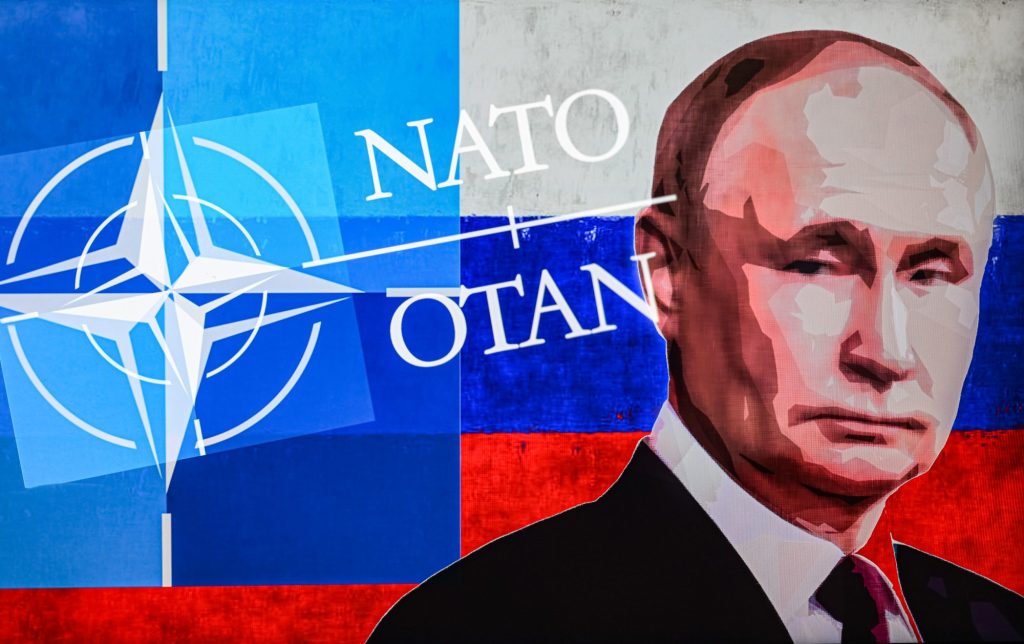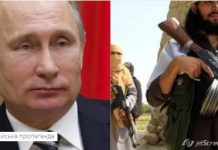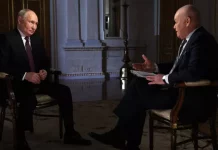By Peter Dickinson, for UkraineAlert
Finland has just become the thirty-first member of NATO and the silence from across the border in Russia is deafening. For more than a year, the Kremlin has been using the distant prospect of Ukrainian NATO membership to justify the largest European conflict since World War II. In stark contrast, Moscow has offered virtually no resistance whatsoever to neighboring Finland joining the alliance, despite the fact that this has more than doubled the length of NATO’s shared border with Russia.
Russia’s apparent lack of concern over Finland’s NATO accession raises obvious questions about the validity of Vladimir Putin’s efforts to portray the invasion of Ukraine as a reasonable response to creeping NATO enlargement. If Putin genuinely felt NATO posed a security threat to Russia, he could have attempted to derail Finland’s membership bid via a combination of diplomatic and military pressure. At the very least, he could have dramatically increased the Russian army presence in the region. Instead, he did next to nothing.
During the period since Helsinki’s May 2022 NATO application, Moscow has largely limited itself to grumbling about the accession process. At the same time, Russia has reportedly withdrawn up to 80% of its forces from the Finnish border zone. “The drawdown we’ve seen from this region in the past seven months is very significant. Russia had this ground force posture facing us for decades that is now effectively just gone,” a senior Nordic defense official told Foreign Policy in September 2022.
Kremlin officials have since reacted to confirmation of Finnish membership by vowing to strengthen Russia’s military potential in the border area, but this belated bluster merely serves to highlight how underwhelming Russia’s overall response has been. The contrast with Moscow’s devastating use of force in nearby Ukraine could hardly be greater.
Why has Putin remained so calm over the NATO membership of one neighbor while waging a major war over the unlikely NATO aspirations of another? After all, even with the Russian army heavily committed in Ukraine, Putin still has vast additional military, diplomatic, cyber, and economic resources at his disposal and could conceivably have opposed Finland’s NATO bid in a wide range of ways. This inconsistency has little to do with legitimate security concerns. Instead, it reflects the unapologetic imperialism that shapes Putin’s personal worldview and defines modern Russia’s national identity.
Ever since the early years of his reign, Putin has made no secret of his bitterness over the Soviet collapse, which he has always viewed as a Russian defeat. In 2005, when he famously referred to the disintegration of the USSR as “the biggest geopolitical catastrophe of the century,” he stressed that it was a tragedy for “the Russian people” and the millions of Russians who suddenly found themselves living beyond Russia’s borders in newly independent countries such as Ukraine. Putin went even further in 2021, lamenting the fall of the USSR as “the collapse of historical Russia under the name of the Soviet Union.” In other words, he regards the entire Soviet era as a continuation of the Czarist Russian Empire, and sees the settlement of 1991 as anything but final.
Putin’s sense of historical injustice has led to an unhealthy obsession with Ukraine, which he insists is an inherent part of historical Russia that has been subjected to artificial separation. He is fond of claiming that Ukrainians are in fact Russians (“one people”), and took the unusual but revealing step in July 2021 of publishing a lengthy essay arguing against the legitimacy of Ukrainian statehood.
This fixation has been further fueled by fears that the emergence of a democratic Ukraine could serve as a catalyst for similar changes inside Russia itself. Putin remains haunted by the pro-democracy uprisings that swept Central Europe in the late 1980s while he was a young KGB officer in East Germany, and views modern Ukraine’s embrace of democracy as a direct threat to his own authoritarian regime. It is no coincidence that in the buildup to last year’s invasion, Putin began referring to Ukraine as an intolerable “anti-Russia.”
Over the past 13 months of full-scale war, Putin’s imperial objectives in Ukraine have become increasingly evident. He has compared his invasion to the eighteenth century imperial conquests of Russian Czar Peter the Great, and has repeatedly spoken of returning historical Russian lands while attempting to annex four partially occupied Ukrainian regions representing almost 20% of the war-torn country. Meanwhile, his army has imposed brutal policies of russification throughout occupied Ukraine, complete with summary executions, forced deportations, the suppression of Ukrainian national symbols, and widespread use of torture against anyone deemed a potential opponent of Russian rule.
Putin’s imperialistic views on Ukraine are regarded as uncontroversial by domestic Russian audiences. While public enthusiasm for the invasion may vary, many Russians share Putin’s rejection of Ukrainian statehood, while millions appear comfortable embracing an unambiguously imperial agenda. However, such messaging would be disastrous on the international stage. To counter this, Putin has sought to frame the invasion of Ukraine as a defensive measure by emphasizing Russia’s longstanding grievances over NATO’s post-1991 enlargement.
This approach has played well in an international climate colored by anti-Western sentiment and widespread suspicion of America’s dominant role in global affairs. Over the past year or so, the NATO expansion argument has proved easily the most effective of the multiple narratives promoted by the Kremlin to defend the invasion. While international audiences have remained largely unconvinced by Russian attempts to portray the war as a fight against everything from Western cancel culture to Satanists and fictitious “Ukrainian Nazis,” Moscow’s accusations toward NATO have resonated around the world. Kremlin claims of NATO responsibility for the war have been echoed by everyone from Chinese President Xi Jinping to prominent Western academics and even Pope Francis.
The success of Russia’s NATO expansion narrative has distorted international perceptions of what is the most brazen example of European aggression since the days of Hitler and Stalin. It has encouraged many commentators to view the war as a clash between two competing superpowers rather than a genocidal invasion by an expansionist empire. This has naturally impacted efforts to end the war, with calls to help Ukraine defend itself often met by demands for NATO to deescalate.
In reality, Russia’s accusations regarding NATO involvement in Ukraine have never stood up to serous scrutiny. Far from pursuing Ukraine, the alliance actually sidestepped calls to grant the country a Membership Action Plan in 2008, settling instead for vague promises of future membership. NATO has consistently refused to revise this position, even after the onset of Russian aggression against Ukraine with the 2014 seizure of Crimea. On the eve of Russia’s full-scale invasion last year, Ukraine was widely recognized as being decades away from potentially joining NATO.
The Kremlin has argued that even without Ukrainian membership, any deepening of cooperation between NATO and Ukraine represents an unacceptable security threat. However, this conveniently ignores the existing NATO status of Estonia, Latvia, and Lithuania, all of which border Russia. The three Baltic states are just as close to Moscow as Ukraine, and have been full members of the alliance for almost two decades without any major incident.
The Kremlin’s passive acceptance of Finnish accession has now further undermined Russian attempts to pose as victims of NATO aggression. After insisting for years that NATO’s largely imaginary presence in Ukraine posed an existential threat to Russia, Moscow must explain why the recent advance of the alliance to Russia’s 1,340 km Finnish border is so comparatively inconsequential. They may wish to present a very different picture to international audiences, but Putin and his Kremlin colleagues clearly recognize that any talk of a NATO attack on Russia is absurd.
This is not to say that Russian displeasure over NATO enlargement is entirely manufactured. On the contrary, Moscow’s objections are real enough, but they are rooted in resentment rather than genuine security concerns. The Kremlin’s frustration over the expanding presence of the alliance is not difficult to understand. While NATO poses no plausible security threat to Russia itself, it does create major obstacles for Russian imperialism. Put simply, NATO prevents Russia from bullying its neighbors.
This should provide critics of NATO enlargement with food for thought. Opponents have long accused the alliance of provoking Russia by welcoming countries from the former Eastern Bloc, but it is now painfully apparent that the decision to keep Ukraine internationally isolated was actually far more provocative in practice. Indeed, the security guarantees that come with NATO membership are probably the only reason why we are not currently confronted by an even larger war and further Russian invasions. Unless Ukraine can secure similar security guarantees, a lasting peace in Eastern Europe will likely remain elusive.
By Peter Dickinson, for UkraineAlert
Peter Dickinson is Editor of the Atlantic Council’s UkraineAlert Service.





